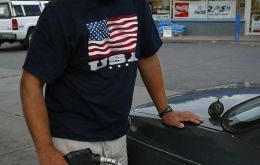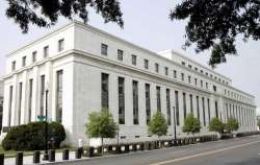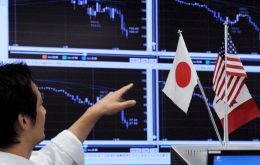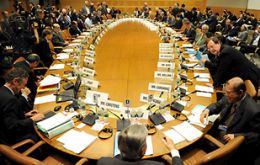MercoPress. South Atlantic News Agency
Economy
-
Thursday, April 30th 2009 - 05:11 UTC
US economy contracts 6.1% in first quarter of 2009; exports plunge

The US economy continued to contract in the first quarter of 2009, led by the biggest fall in exports for 40 years. US GDP contracted at an annualised rate of 6.1% during the quarter, little improvement on the 6.3% fall in the last three months of 2008.
-
Thursday, April 30th 2009 - 04:44 UTC
Fed sees recession easing and reiterates expansion of money supply

The US Federal Reserve has kept interest rates on hold at its current range of between zero and 0.25% and has suggested the recession may be easing. It also said it would continue with its “quantitative” current approach of purchasing long-term government debt to expand money supply.
-
Wednesday, April 29th 2009 - 11:38 UTC
Swine flu continues to weight on global shares

Global shares have fallen further in Tuesday trading as the swine flu outbreak continues to weigh on markets. The UK's FTSE 100 finished the day 1.7% lower, while markets in Paris and Frankfurt ended almost 2% down. In the US, Wall Street also saw losses.
-
Wednesday, April 29th 2009 - 04:06 UTC
Output of world’s main iron ore producer plunges 37%

Brazilian mining giant Vale do Rio Doce, the world’s largest iron ore producer and exporter, revealed Tuesday its output plunged 37% in the first quarter of 2009, compared to the same period a year ago, amid a sharp decline in demand.
-
Sunday, April 26th 2009 - 08:56 UTC
World Bank-IMF open crisis talks

Senior officials of the International Monetary Fund (IMF) and the World Bank are meeting in Washington with an aim to combat the world's worst economic slump since the 1930s.
-
Saturday, April 25th 2009 - 10:42 UTC
Uruguayan farmers estimate drought losses in 868 million USD and 12.800 jobs

The intense six month drought suffered by Uruguay this summer cost the farming sector an estimated 868 million US dollars and the loss of 12.800 jobs according to a report from the country’s main farmers’ organization. The loss breaks down to 75% livestock; 11% agriculture; 11% dairy farming and 3% citrus plantations.
-
Saturday, April 25th 2009 - 10:38 UTC
Brazilian unemployment climbs to 9% in March

Brazilian unemployment remained steady with a growing tendency in March, having reached the highest since September 2007, 9%, reported the country’s Statistics and Geography Institute, Ibge.
-
Saturday, April 25th 2009 - 10:31 UTC
EIU downgrades Uruguay’s 2009 growth to 0.2%

Uruguay will experience a serious deterioration of its exports in 2009 with impacts on the rest of the economy and growth limited to a mere 0.2%, according to The Economist Intelligence Unit, EIU.
-
Saturday, April 25th 2009 - 10:26 UTC
China poised to become the world’s second economy in 2010

In spite of a considerable slowdown this year, China is poised to become in 2010 the world’s second largest economy, behind United States and ahead of Japan, according to the IMF World Economic Outlook released this week.
-
Saturday, April 25th 2009 - 07:20 UTC
UK economy shrinks 1.9% in the first quarter of 2009

The UK economy shrank 1.9% in the first three months of 2009, according to gross domestic product (GDP) data from the Office for National Statistics. The contraction was much worse than had been expected and was the biggest three-month decline in GDP since the third quarter of 1979.
